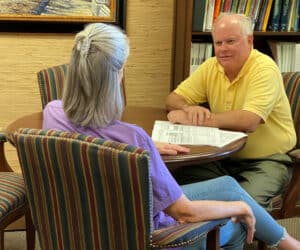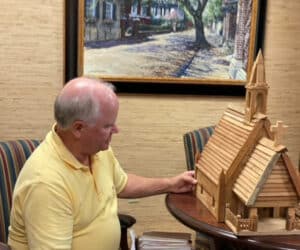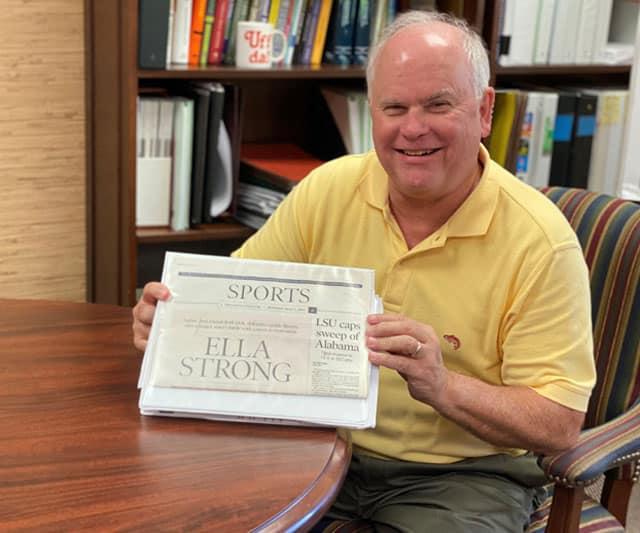This time it’s personal.
After nearly 50 years of advising retired dentists, older single women and widows of retired businessmen with high net worth, Baton Rouge CFP and CPA Kerry Uffman is directing his financial planning expertise close to home: his college freshman granddaughter, honors student Ella.
Before Ella entered LSU in August, Huffman, 70, created a workbook for her with advice on money management, how to live independently and why women matter.
“Why? Ella, my first of 10 grandchildren, declared the first thing she was going to do when she graduated (from high school) was … dye her hair pink! Then she continued with a declaration of a bunch of ‘wild’ ideas.’’
That was in the spring. Alarmed by his granddaughter’s comments, he then spent his post-tax season vacation at the beach drafting a series of ideas about navigating life as a young, independent woman. He sent the draft to his granddaughters’ mothers, and then met with Ella to discuss his plan.
“I have since met with her to go over the workbook. I won’t give it to her until she begins living on campus for a while, because otherwise it will wind up on a shelf!’’
The workbook explains how to manage cashflow for the first four years of independent living (at college), and during the next five years after graduation, with a tax model included. There are his essays on linear versus exponential thinking, and what he calls a “Program of Work for Multimillionaires (How to Become),’’ with safe annual savings rates included.
The psychology of happiness
But it’s not all numbers: Uffman includes essays written by psychologist Abraham Maslow, who created Maslow’s Hierarchy of Needs, about how psychological health is achieved, and by self-improvement writer Dale Carnegie, whose 1936 book “How to Win Friends and Influence People’’ is still in print. Uffman also inserted essays written by human potential writer and Esalen Institute guru George Leonard, and by psychologist Daniel Levinson.
Levinson’s book “The Seasons of a Woman’s Life’’ (1996),was described by the New York Times as “A highly nuanced portrait, in every shade of gray, of individual women negotiating the transitions of what Levinson calls early adulthood ages 18 to 45.” The women Levinson studied included financial analysts and homemakers.
Why women?

Uffman says he has been asked why he has leaned heavily toward helping women handle their money and their lives.
“I think back to feeling the pain of women in my family, when confronted by power that they did not have,’’ he says.
“Obviously, that comes from my mom and all her sisters. My aunts and my mom came from a big family, living on a farm in central Louisiana. All the women became great intellectuals, and they were very important in my life,’’ he says.
A celebrated aunt
An aunt, Sue Eakin (1919-2009), a historian who taught at LSU, rescued “Twelve Years a Slave,’’ the forgotten memoir by Solomon Northup, a slave who lived in Louisiana near Eakin’s family farm. She wrote her master’s thesis on the memoir and in 1968, published its first modern edition. She worked on an expanded edition until shortly before her death, and Hollywood came calling.
The movie “Twelve Years a Slave,’’ based on the memoir, won the Academy Award as best picture of 2013. Its director, Steve McQueen, thanked Uffman’s aunt in his acceptance speech, calling her “This amazing historian Sue Eakin.’’
Economic inequality
“My grandfather had a big farm and so obviously, Black culture was part of it. My aunt and her other sister became PhDs. These were not dumb women, but women who were very strong around my home. I know it had a strong impact on me, and yet, the women placated the men.’’
Uffman remembers being shocked at a contentious spat his parents had when his mother bought him a new bicycle without first okaying it with his father. And he remembers that his grandfather was harshly demanding of his grandmother.
“These were German, very German people,’’ he explains succinctly.
Breaking the cycle
Early in his marriage to his high school sweetheart, Cookie, Uffman made $900 a month as a CPA. Cookie’s teacher’s salary, earmarked for savings, was instead eaten up by inflation. But they were equals.
“I graduated from college in 1975, right when women started launching themselves. It always felt like the release of women, like it was time for them to get out there and get after it; but inflation ate every bit of my wife’s salary,” says Uffman, an LSU alum.
“Ultimately, I don’t know how I got into accounting. It just seemed right at the time so I leaped at it,” he says. “I remember going to a board meeting of a local YMCA and watched a consultant lead the group through a retreat-type process. It really helped me to realize that accounting was a language, not a compliance thing.”
“I really got into consulting at that moment. I told a banker that better loans can be made if you help clients communicate what they want through a business plan.’’
New beginnings
Uffman says he learned about geometric thinking and the 3:1 debt ratio through a lecture series created by California CPA Darrell Cain. At that point, Uffman decided to move into financial planning. He created his own Baton Rouge firm in the 1980s, then merged with another firm.

He began providing retirement planning when he hit 60, after meeting happily retired teachers and firemen on a cruise to Alaska: He figured it was a good way to help people and earn a living.
Uffman is an owner and retired partner of TRWU CPAs & Financial Advisors, a mid-sized Baton Rouge CPA firm manages $80 million in AUM for approximately 45 client families. He still consults on tax and financial matters for the firm’s clients. Intergenerational planning is especially important for his clients with large investments in real estate, farmland and timber land.
He also mentors younger CPAs and financial planners and is looking to buy another RIA firm that has clients whom TRWU’s younger advisors can become trusted advisors to.

Uffman plans to work as long as he is mentally sharp. He is also a woodworker who makes furniture in the 18th century style, and accessories such as birdhouses; he works in teak and mahogany.
“A garden bench takes 30 board feet to make. A lot of the teak limber is cut away to have only what is needed just for the bench, so there are ‘wasted’ cuttings,” he says. That’s what he uses to make teak birdhouses; “The church style was interesting to build.”
Cultivating money maturity
With clients, “I learned to be ready to listen and to be curious enough to engage. I found that going after things and taking chances was a good way to master content.’’
Uffman is planning to help his granddaughter Ella do the same.
He says she is very smart academically ( she is attending LSU on a scholarship) but naïve about the ways of the world. Which makes her a typical 18-year-old.
“There is a lot of potential there, a lot. But you just don’t know. Reading George Kinder’s ‘Seven Stages of Money Maturity,’ the way he talks about money and innocence and the pain it creates — that became my ultimate model — innocence,” says Uffman. “She can use the workbook when she is in pain.’’
It runs in the family
It’s easy to see why Uffman feels compelled to help all his grandchildren navigate their lives by teaching them financial savvy. Uffman’s father, LSU graduate Kenneth E. Uffman (1928-2012), was CEO of the Credit Bureau of Baton Rouge. Kenneth and his wife, Grace, had five sons, all of them Eagle Scouts.
“My dad actually created a financial literacy curriculum that became state law. But when he tried to teach financial literacy to his [15] grandchildren, they rolled their eyes. I don’t want to have that happen with my grandchildren,” says Uffman.
“I have to try to figure out how to relate financial literacy to Ella so she’s prepared for life, so she cannot be manipulated by anybody,” he says. “I do strategic and business planning, and I study processes a lot; I study a lot about geometric versus linear thinking, so I know I have a lot to share.”
“I have not given her the book yet because as I said, it will wind up on a shelf! But it will be a talking resource. It will definitely be, ‘Hey, let’s get together and let’s look at this particular part of the workbook.’”
Additional Reading: Tequila Bandleader, 88, Lands Sony Record Deal
The ultimate goal
Ultimately, Uffman wishes for his grandchildren the strength to live without fear or indecision.
“The concept of them being ‘strong’ and not subject to being manipulated by others is the objective — because they are prepared to become independent because of rational capacities to be financially literate. And with common sense, create the proper life structure to launch themselves into young adulthood with vigor.’’
Uffman has already shared the workbook with his own children. He also plans to share it with his clients who are grandparents. “I’ll do that when I sense stress about their grandchildren is occurring.’’
In a four-decade career in journalism, Eleanor O’Sullivan has reviewed many books on best practices for financial advisors, has written for Financial Advisor and the USA Today network, and was the movie critic for the Asbury Park Press.







